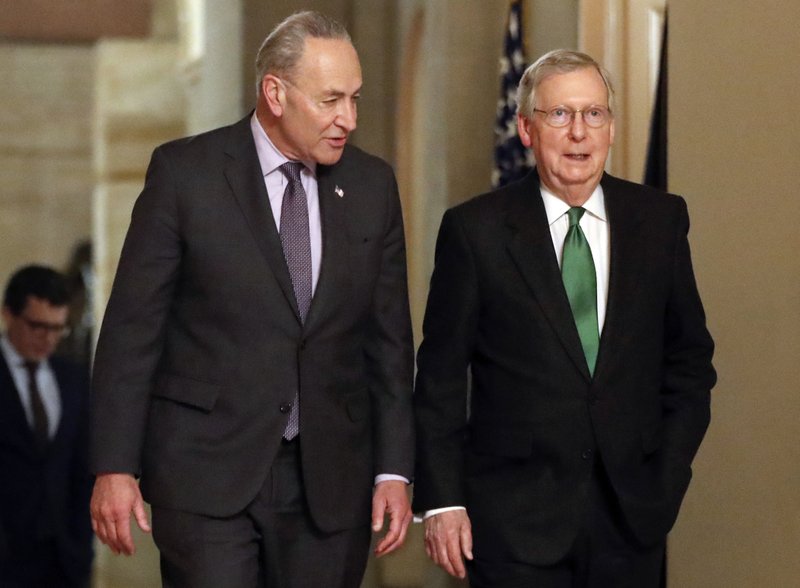WASHINGTON -- Some of the old timers in the Senate are getting fed up with the lack of action on legislation, but after weeks of focus on approving President Donald Trump's backlog of nominees, there's a chance the chamber will soon be stretching its legs again.
Don't look for action on top-tier issues like infrastructure funding, stabilizing "Obamacare" or a trade pact. But next-level measures are moving onto Capitol Hill's agenda, including bills to tackle prescription drug costs, fund the government, increase the Treasury's borrowing cap and address the humanitarian crisis at the southern border.
The potential for a new legislative push on middle-tier issues promises to test the Senate, where the basics of legislating sometimes get lost and where talented newcomers like former GOP standard-bearer Mitt Romney and former two-term Florida GOP Gov. Rick Scott are already experiencing frustration at the state of things. With the 2020 presidential campaign well underway, lawmakers know the window for action will quickly close.
Pitfalls lay ahead. Partisanship, impeachment fever and a volatile, unpredictable Trump pose obstacles, as does an increasingly testy and pointed relationship between the Senate's top leaders, Majority Leader Mitch McConnell, R-Ky., and No. 1 Democrat Chuck Schumer of New York. The GOP-led chamber has yet to act on initiatives trumpeted and passed by House Speaker Nancy Pelosi, D-Calif.
"It's not a good atmosphere in which to do anything that requires bipartisan cooperation," said No. 2 Senate Republican John Thune of South Dakota. "But there are things that we have to do around here."
Thune was elected to the Senate in 2004, toppling powerful Minority Leader Tom Daschle after a campaign that labeled the Senate a "Daschle dead zone." Now he worries about farmers struggling with Trump's trade agenda and low commodity prices during weeks in Washington when all the Senate seems to do is vote on judges and lower-level nominees.
Some measures have moved of late, including a long-overdue $19 billion disaster aid bill and legislation sponsored by Thune and veteran Democrat Edward Markey of Massachusetts to combat abusive robocalls, which passed last month by a 97-1 vote.
Markey has served in Congress for more than four decades and is the type of lawmaker Republicans need to work with to get results: veteran, experienced legislators with a track record of doing deals. Markey has lots of legislative muscle memory built up on the House Energy and Commerce Committee during its glory years of the 1980s and '90s and was a player in the Pelosi-led House majority of 2007-2010.
Other senators are getting ready to step up, including the travail-tested partnership atop the Health Education, Labor, and Pensions panel. There, Chairman Lamar Alexander, R-Tenn., who is retiring from the Senate next year, and veteran Democrat Patty Murray of Washington are planning to pass legislation to take on health care and drug costs, including a smorgasbord of widely supported provisions aimed at lowering prices.
Alexander and Murray forged consensus in 2015 on legislation to rewrite the Bush-era "No Child Left Behind" elementary education law, but their efforts to pass a bipartisan fix to Obamacare last year fell apart. The two share a common approach that includes bridging consensus within one's party caucus, limiting talks to serious players, and making sure the other sides can claim wins.
"Deal making and lawmaking in the Senate emanates from the middle of each conference -- not from the middle of the body as a whole," said Mike Spahn of Precision Strategies, who was until recently Murray's chief of staff. "It's driven by members that have credibility with a significant portion of individual caucuses. That's just where the big stuff happens."
The Senate has other legislative veterans itching to get going, cognizant that anything produced under the current iteration of divided power needs to start moving soon to succeed. For Republicans like Finance Committee Chuck Grassley of Iowa, probably in his last term at 85, there's no guarantee that this won't be the last time he can work with a GOP administration on legislation.
"I just came from a meeting where there's five bills we can get up between now and August," Grassley told reporters in late May as he exited a meeting of GOP chairmen assessing opportunities for the summer schedule.
"Both the HELP Committee and the Finance Committee have been working on a series of proposals dealing with health care costs and many of us have contributed to that," said Sen. Susan Collins, R-Maine. "I certainly want to see a fuller legislative agenda. I understand that we needed to clear out this backlog of nominations, but then I expect we will turn to legislation, and there are a lot of opportunities."
A driving force is the reality that the calendar for legislation becomes more challenging as the year goes on -- pressing issues like the debt limit or a mini-budget deal to increase spending "caps" will take priority -- and next year's presidential election promises to tax everyone's political bandwidth.
Andrew Taylor has covered Congress for The Associated Press since 2005.
Editorial on 06/04/2019